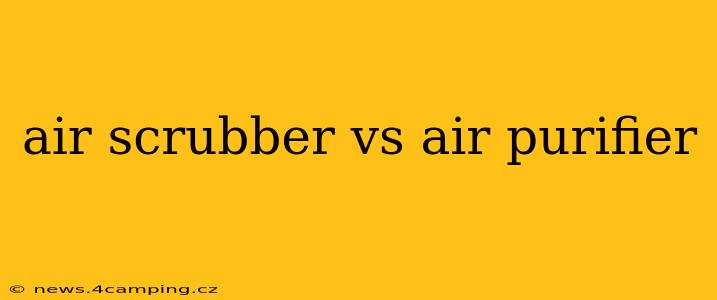Choosing between an air scrubber and an air purifier can be confusing, as both aim to improve indoor air quality. However, they employ different technologies and target different pollutants. This detailed comparison will help you understand the key differences and determine which is best for your needs.
What is an Air Purifier?
Air purifiers are designed to remove airborne particles like dust, pollen, pet dander, mold spores, and some allergens. They typically use one or more filtration methods, such as:
- HEPA filters: High-Efficiency Particulate Air filters are highly effective at trapping tiny particles, often removing 99.97% of particles 0.3 microns in size or larger.
- Activated carbon filters: These filters absorb gases and odors, improving air quality by removing volatile organic compounds (VOCs) like formaldehyde and smoke.
- UV-C light: Some air purifiers incorporate UV-C light to kill bacteria and viruses.
Air purifiers are generally best suited for removing particles from the air, but their effectiveness against gases and odors varies depending on the filter type.
What is an Air Scrubber?
Air scrubbers, often referred to as whole-house air scrubbers, are more comprehensive systems typically installed in your home's HVAC system. They actively remove airborne pollutants and also address surface contaminants. They use a combination of technologies, often including:
- HEPA filtration: Similar to air purifiers, they often employ HEPA filtration to remove airborne particles.
- Photocatalytic oxidation (PCO): This process uses UV light and a catalyst to break down pollutants like VOCs, mold, and bacteria at a molecular level. This is a key differentiator from standard air purifiers.
- Electrostatic precipitation: This technology uses an electrical charge to attract and remove particles from the air.
Air scrubbers offer a more powerful and comprehensive approach to air purification, tackling both airborne and surface contaminants. Because they're typically integrated into your HVAC system, they clean the air throughout your entire house, unlike standalone air purifiers.
Air Scrubber vs. Air Purifier: Key Differences Summarized
| Feature | Air Purifier | Air Scrubber |
|---|---|---|
| Technology | Filtration (HEPA, activated carbon, UV-C) | Filtration, PCO, electrostatic precipitation |
| Installation | Standalone unit | Integrated into HVAC system |
| Coverage | Limited to the room where it's placed | Whole-house coverage |
| Pollutant Removal | Primarily airborne particles, some gases | Airborne and surface contaminants, gases, odors |
| Cost | Generally less expensive | Significantly more expensive to purchase and install |
| Maintenance | Filter replacement | Filter replacement, potential need for professional service |
How Do I Choose Between an Air Scrubber and an Air Purifier?
The best choice depends on your specific needs and budget:
- Choose an air purifier if: You need a relatively inexpensive solution for a specific room, primarily targeting airborne particles and perhaps odors.
- Choose an air scrubber if: You want whole-house air purification, addressing a wider range of pollutants including surface contaminants, and are willing to invest more upfront.
What are the benefits of using an air scrubber?
Air scrubbers offer several advantages over standalone air purifiers:
- Whole-house coverage: They purify the air throughout your entire home, providing more comprehensive protection.
- Removal of surface contaminants: Unlike air purifiers, they actively remove pollutants from surfaces, reducing the overall level of contamination.
- More effective VOC removal: The use of PCO technology often leads to more efficient removal of volatile organic compounds.
What are the benefits of using an air purifier?
Air purifiers are also a viable option for many:
- Lower initial cost: They are generally less expensive to purchase than air scrubbers.
- Portability: You can easily move them from room to room as needed.
- Simpler maintenance: Maintenance is typically limited to filter replacement.
Are air purifiers and air scrubbers safe?
Both air purifiers and air scrubbers are generally safe when used as directed. However, always follow the manufacturer's instructions for operation and maintenance. With air scrubbers, professional installation and maintenance might be necessary. Some people might experience mild irritation from ozone generated by some air purifiers, so it’s important to research the model you’re considering.
This detailed comparison should provide a clearer understanding of the differences between air scrubbers and air purifiers, helping you make an informed decision based on your specific needs and budget. Remember to consider the size of your home, the types of pollutants you're concerned about, and your budget when making your choice.
